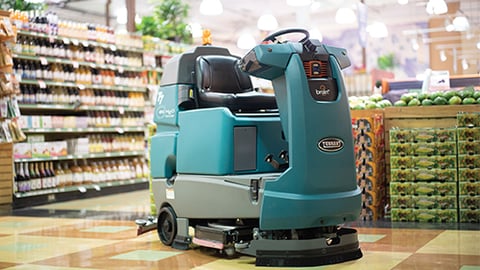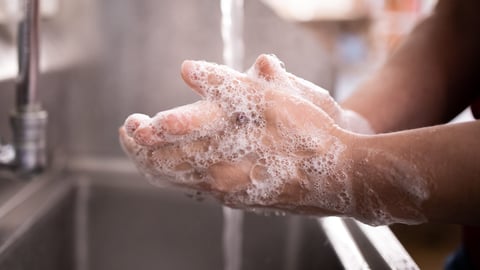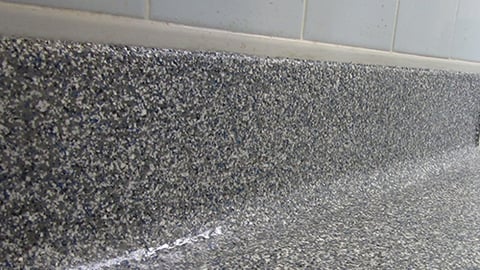Cleaning House in the Wake of COVID-19
From the first step inside a grocery store, it’s apparent how much COVID-19 has affected sanitation and disinfection practices. Many stores now have stations set up with spray bottles of cleaners, paper towels and wipes for customers to clean their carts before they start shopping. Others have posted dedicated staff at entryways to sanitize carts right in front of shoppers.
Key Takeaways
- In tandem with increased consumer concerns, retailers have stepped up their sanitation practices since the beginning of the coronavirus pandemic.
- Along with rigorous deep-cleaning protocols, grocers are making use of such solutions as hand-sanitizing stations, portable sinks, ultraviolet-C light disinfection systems and improved HVAC to lower the risk of viral transmission.
- Proper training of associates goes hand in hand with enhanced sanitation measures and practices.
Inside the store, various sanitation practices visually demonstrate a retailer’s commitment to protect customers the best they can from exposure to COVID-19. As with carts, these practices are often a combination of personal cleaning via mobile hand-sanitizing stations or wipes, and employees tasked with regular or constant sanitation of touchpoints such as door handles and knobs, countertops, basket handles, and case rails.
In addition to consumer-facing sanitation measures, grocers are taking other steps behind the scenes to reduce the risk of viral spread. While less visible, these tools – many of them newly implemented in retail settings — are important in keeping physical spaces and employees who interact with consumers and products as clean as possible.
Stepped-up sanitation is the right thing to do, and it’s also important to today’s wary consumers. According to the 2020 “U.S. Grocery Shopper Trends” report released this summer by FMI — The Food Industry Association, 57% of consumers say that keeping the store sanitized is a priority, and 52% say that providing wipes for carts is a priority. The same survey found that 54% of shoppers are concerned about being exposed to the virus from other shoppers, and 44% report that they worry about picking up the virus from store surfaces.
Worried consumers can benefit from systems that do the cleaning for them and by being educated about proper protocols and techniques. One study conducted for Missoula, Montana-based sanitation provider Cennox reveals that 50% of shoppers wrongly believe that bleach and alcohol wipes immediately kill the virus that causes COVID-19.
“In the case of alcohol and bleach solutions, these can take up to 10 minutes to be effective, so if anyone else carrying COVID-19 has used your basket, trolley or payment terminal in that time, it will have done nothing to stop the spread of infection,” points out Nick Cockett, COO at Cennox, noting that education and enhanced sanitation techniques go hand in hand.
Stationed for Sanitation
As part of in-store infection control practices, hand sanitizers have become ubiquitous. While retailers stock an array of hand sanitizers for purchase, they also provide sanitizers at various spots in the store for their customers to use while shopping. Many of these are touchless dispensers set up in what could be considered critical control points, including near checkout areas, doors, and areas with many surfaces, such as the deli or produce section.
Even as sanitizers become fixtures in stores, grocers are adding other personal hygiene solutions to help shoppers stay clean while on the premises. Ozark River Manufacturing, based in Nashville, Tennessee, offers portable sinks that can be installed in certain areas of the store so that customers can wash their hands with soap and water for the recommended 30 seconds. The NSF-certified portable hand sinks don’t require any plumbing and can also be set up in employee back rooms, in addition to key shopper sites like the deli, bakery and produce sections.
Points Taken
Apart from hygiene solutions for shoppers and employees, retailers are deploying several other methods of sanitation and disinfection to safeguard against viral transmission on contact surfaces, or fomites, within their stores.
A deep clean during off hours, performed by third-shift employees or outside sanitation contractors, has become daily protocol since the pandemic began last spring. To enhance sanitation and show consumers that they take cleanliness seriously, grocers are adding to that by cleaning throughout the day, sometimes on a near-constant basis.
As part of such thorough cleanings, virus-killing mists and fogs can be used to disinfect food preparation areas and handling spaces as well as in-store dining areas. Floor-cleaning robots are another tool in the deep cleaning of heavily trafficked surfaces. Electrostatic sprayer systems also help retailers cover more ground when sanitizing.
Ultraviolet-C (UV-C) light is another weapon in the arsenal against the coronavirus.
Bluewater Technologies Group, based in Farmington Hills, Michigan, offers a sanitizing shopping cart system in which carts are put through a medical grade UV-C experience and sanitized in under a minute, covering spots that manual sanitation might miss.
Cennox, for its part, has developed a keypad cleaner that uses UV-C light to neutralize viruses such as COVID-19 in less than 30 seconds. The company’s survey of shoppers affirmed that they’re watching for such interventions at perceived points of vulnerability: 53% expect to see technology solutions put in place at payment terminals and believe that the responsibility for disinfecting payment areas should be taken away from employees, while an overwhelming 89% say that they would be willing to accept a 30-second delay at checkout if that meant thorough sanitation between transactions.
Retailers are using UV-C light in other ways to reduce the potential for viral spread on surfaces. PurpleSun, based in Long Island City, New York, offers a UV-C light disinfection system for commercial and public spaces. The provider has collaborated with experts at Northbrook, Illinois-based Underwriters Laboratories to make sure that its system meets industry safety standards.
Because poor ventilation has been shown to be a risk factor for the potential spread of COVID-19 inside buildings, retailers can make improvements to their ventilation and air filtration systems. From simply increasing the amount of outside air or using ceiling fans, to switching to MERV 13 filters in HVAC systems, small changes can make a difference in slowing the spread of the novel coronavirus. One new tool designed to kill this virus and others is a plug-and-purify air filtration system from Houston-based Integrated Viral Protection.
All in on Sanitation
To ensure the effectiveness of various elements of in-store sanitation, retailers need to work closely with their employees. Posting wall charts and signing off on sanitation checklists are relatively easy ways to make sure that sanitation tasks get done.
Training also goes hand in hand with sanitation measures and practices. That’s especially true with the use of UV-C light and in regard to certain chemicals that aren’t effective or can be downright dangerous for employees or customers if not used properly.








